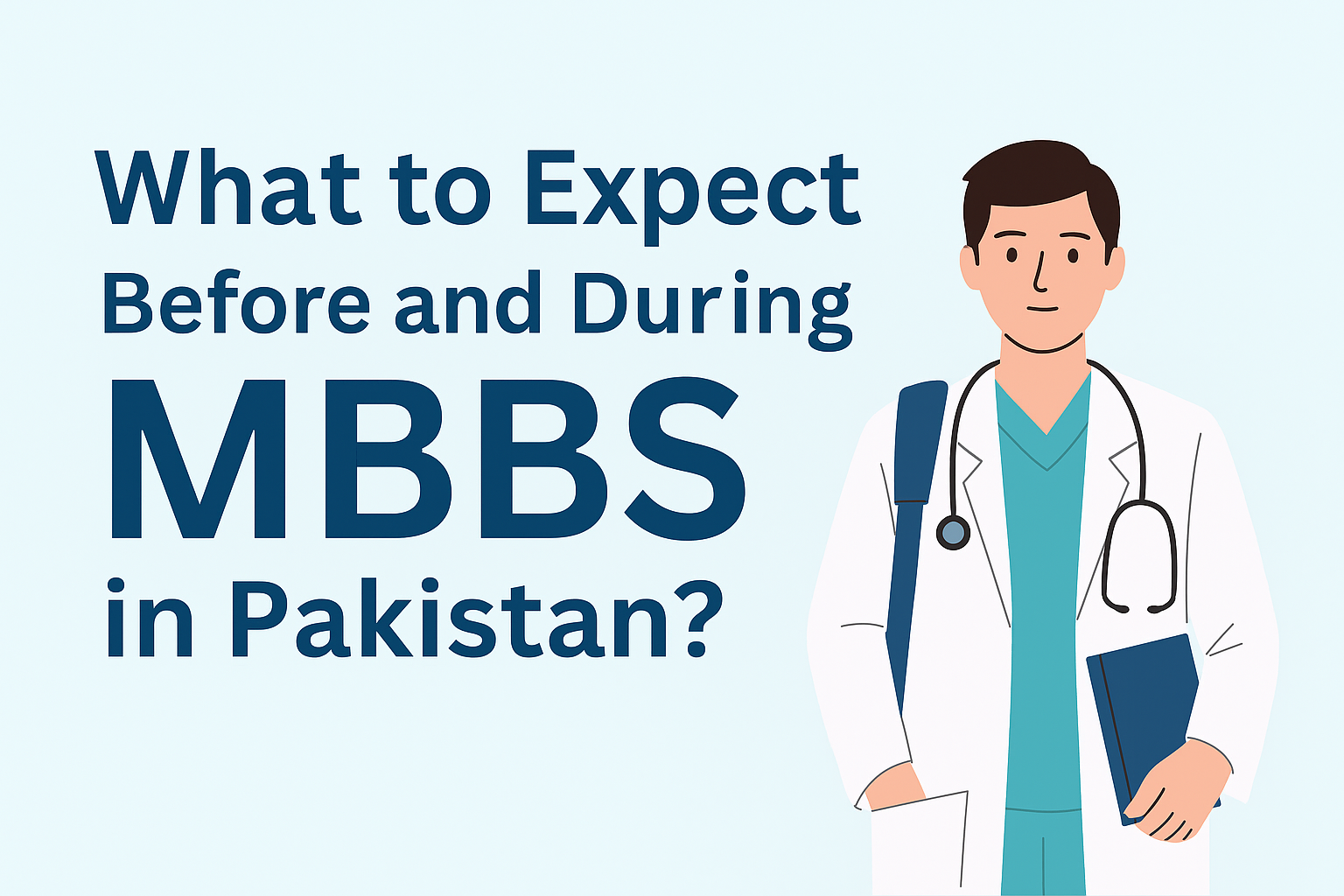What to Expect Before and During MBBS in Pakistan

You’re about to begin something that will test you in more ways than one. In Pakistan, the MBBS journey takes six years, five packed with academic learning, and one full of hands-on experience in the hospital. You’ll start by learning the structure of the human body and eventually find yourself diagnosing patients, assisting in surgeries, and taking charge in clinical settings.
In this guide, you’ll understand what lies ahead, how to deal with it, and how each stage brings you closer to becoming a doctor.
Getting Started – Eligibility, Entry & Structure
Before you begin your first year in medical school, it helps to get clear on:
- how admission works
- what you’ll study
- where you can get the right books
This section walks through the basics every incoming medical student in Pakistan needs to know.
Admission Requirements
To apply for MBBS in Pakistan:
- Complete FSc Pre-Medical or A-Levels with Biology, Chemistry, and Physics
- Achieve at least 60% marks as required by the Pakistan Medical And Dental Council
- Sit for the MDCAT, a compulsory entrance exam that plays a major role in college selection
The MDCAT score significantly impacts your chances of entering public or private medical colleges.
What the MBBS Program Includes
Duration:
- 5 years of academic study
- 1-year house job (internship) after graduation
Academic Focus:
- Early years focus on theory-heavy subjects like Physiology and Anatomy
- Later years involve clinical training, where you observe and assist in hospitals
You’ll spend time in wards, interact with real patients, and begin applying your classroom knowledge in supervised settings.
Curriculum Structure:
- Outlined in the PMDC official curriculum
- Each year introduces a different academic and clinical focus
- Some institutions add electives or research projects in final years
Choosing the Right Resources from a Trusted Bookstore
Most students don’t know which books are actually useful until it’s too late. Colleges may update their recommended book lists each session, which is why many students rely on:
- senior recommendations
- Faculty-approved books often shared early in the semester
- Buying Medical Books Online
Popular Books:
- Guyton and Hall for Physiology
- Snell’s Clinical Anatomy for Anatomy
- And a lot more!
- Other books from the HEC-approved list are also frequently used in tests
Year 1 – Building Your Basic Medical Knowledge
In your first year of MBBS in Pakistan, you’re placed directly into the core of medical science.
The structure is clear, yet the pace feels fast.
According to the PMDC MBBS curriculum, your job is to:
- learn how the body is built
- understand how it functions
- explore what chemical processes keep it alive
This year isn’t just about passing subjects — it sets your foundation for clinical work later on.
Core Subjects
- You’ll work with cadavers
- Explore bones
- Understand organs
- Examine how systems are arranged
- Covers internal functions
- Explains how blood flows
- How lungs exchange gases
- How the nervous system fires signals
- Focuses on molecules in the body
- What they do
- How they interact during digestion, respiration, and more
Additional Courses
- Islamic and Pakistan Studies
(a regulatory requirement in public universities) - Behavioral Sciences
Introduces you to patient interaction, medical ethics, and communication methods.
Tip:
Start early. Stick to one set of recommended resources. This helps reduce confusion and ensures you’re covering what actually matters for that year.
Year 2 – Connecting Concepts and Clinical Basics
New Subjects & Clinical Integration
In your second year, things start to feel different. As outlined by the PMDC MBBS Curriculum, these subjects sit right at the center of your shift from books to hospital rounds.
- Pharmacology explains how medications act inside the body.
- Pathology focuses on what actually goes wrong inside organs and tissues.
- Community Medicine connects you to health trends across populations.
You’ll go through:
- Scheduled lab sessions
- Small group discussions
- Weekly tutorials focused on practical application over memorization
Peer collaboration
You will benefit from others. Many students in public or private groups shared that working in groups, pooling notes, and revising together helped them stay on track during weeks when stress felt constant.
Year 3 – Your First Steps into Patient Care
Core Subjects
This year changes how you learn. You begin applying what you studied earlier to real examples. The main areas you’ll cover include:
- Pathology: You study how different illnesses damage tissues and organs, using actual cases and lab reports as reference points.
- Pharmacology: You break down how medicines act inside the body, how they’re given, and which side effects to watch for.
- Forensic Medicine: You learn about cases involving injuries, poisonings, and legal responsibilities doctors must handle.
- Community Medicine: You explore how health is affected by the environment, policies, and preventive actions across groups of people.
Starting Clinical Rotations
You’ll now wear your white coat for more than just lab time. Third year puts you in hospital wards, standing beside patients while doctors explain what’s happening.
- Rounds involve following doctors as they visit each patient.
- You’ll note what’s said, observe symptoms, and record case data.
- Group discussions help you spot key points in real conditions.
If you’re not prepared, this part gets stressful quickly. But if you read regularly and review what happens in the wards, you’ll adjust faster than most.
Year 4 – Real Clinical Experience Begins
Rotations and Major Subjects
By the fourth year, your focus moves sharply into the clinical side of medicine.
You rotate through core specialties that form the structure of hospital-based medicine:
- Otorhinolaryngology (ENT)
- Ophthalmology (Eye)
- General Surgery
- Pediatrics
- Obstetrics and Gynaecology
You:
- listen to cases
- assist in patient rounds
- note symptoms
- prepare to discuss findings with senior doctors
Each rotation exposes you to different patient types, conditions, and procedural methods.
Workplace-Based Learning (WBL)
You now start doing real work under direct supervision.
This stage is about applying what you’ve studied in practical, live environments.
WBL involves:
- evaluation by consultants and clinical faculty
- participation in managing real patients
Your performance depends on how well you carry out core tasks:
- Taking detailed patient histories without missing key information
- Completing full physical exams, making sense of clinical signs
- Explaining cases clearly during team discussions or consultant rounds
- Staying composed while interacting with patients and their families
One published study in JCPSP showed that fourth-year students felt WBL directly improved their thinking during patient assessments. It helped them make quicker decisions and work with confidence.
You’re in the hospital most of the day, rotating through departments that demand both speed and precision.
So, use your time wisely:
- Review patient cases in the evening
- Revise core concepts with your rotation group
- Equip yourself with practical handbooks and subject-specific references
A dependable Bookstore will help you find exactly what students before you have used, what works, and what saves time on the floor.
Year 5 – Getting Ready for Real Practice
Advanced Rotations & Final Exams
In your final MBBS year, clinical exposure intensifies. Rotations in
Medicine & Allied,
Surgery & Allied,
Obstetrics & Gynaecology,
Dermatology, and
demand application of accumulated knowledge.
These rotations involve:
- Diagnosing patients
- Managing cases
- Making informed decisions under supervision
The Final Professional Examination is comprehensive. It includes:
- Theory papers
- Practical assessments
- Vivas
- OSCEs (Objective Structured Clinical Examinations)
Each patient interaction, ward round, and case discussion tests your skills and confidence.
Utilize this year to transition from a medical student to a competent clinician.
Research & Future Planning
Many medical colleges require a research project or thesis in the final year.
This opportunity allows:
- Contribution to clinical knowledge
- Enhancement of analytical thinking
- Strengthening of your CV for future specialization
Students also begin preparing for postgraduate exams like:
This period is very important for deciding on your area of specialization and aligning your efforts accordingly.
Use your final year to:
- Refine clinical judgment
- Build confidence
- Maintain consistency
Many Medical Students Prefer Buying Medical Books Online
- Find textbooks fast without wasting time
- Get the latest editions with updated content
- Avoid out-of-stock issues at campus stalls
- Compare prices before placing an order
- Access books not easily available offline
- Save travel time with direct home delivery
- Track your order and avoid last-minute stress
A trusted bookstore ensures all this so you can focus on your studies!
House Job – From Student to Doctor
After passing your MBBS final exams, you enter a one-year house job that functions as your clinical internship. This period is not optional. It’s a requirement for getting your full registration with the Pakistan Medical & Dental Council (PMDC).
You’re now moving into active care, where patients are real and decisions matter more than ever.
Typical Rotations
- 3 months in Medicine, covering internal specialties
- 3 months in Surgery, including allied surgical departments
- 3 months in Obstetrics & Gynaecology or Pediatrics
- 3 months in a specialty of your choice like Dermatology, Psychiatry, or Radiology
The time you spend here isn’t passive. You start contributing in ways that carry weight.
Your daily tasks involve:
- Writing notes
- Checking vitals
- Assisting in clinical procedures
- Presenting cases to consultants
- Handling emergencies under supervision
Some hospitals might allow you limited autonomy depending on how well you adapt.
Prepare Smarter for Each Step Ahead
Completing your MBBS in Pakistan changes the way you think, study, and approach responsibility. Medical education isn’t just about passing exams. It’s about preparation that reflects what hospitals and patients expect. If schedules get tight, Complete Buying Medical Books Online in Pakistan can help you stay stocked without losing precious time in queues or dealing with limited stocks. The effort you invest today is already shaping your role as a future doctor.


